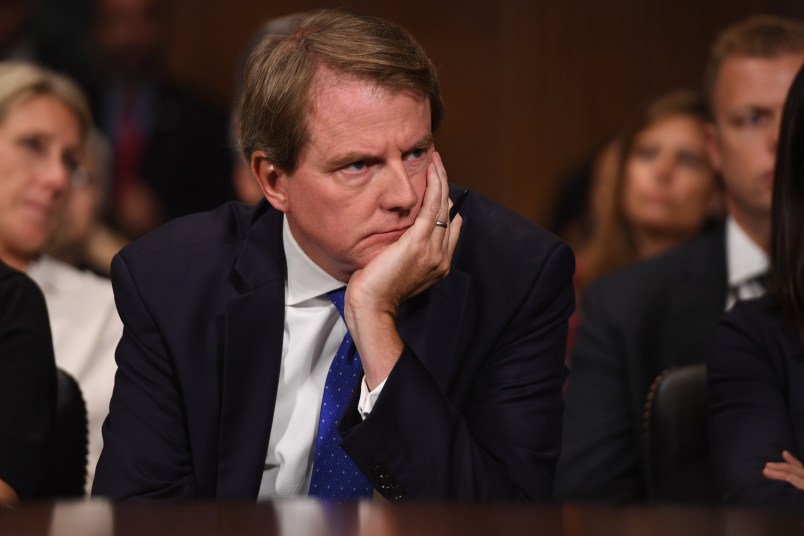The Friday appeals court decision not to enforce a House subpoena of former White House counsel Don McGahn eviscerates congressional power and all but ensures “future Presidential stonewalling,” appellate judge Judith W. Rogers wrote in a blistering dissent.
Rogers’ dissent came as two of her fellow judges on a D.C. appeals panel ruled to allow McGahn to defy a subpoena from the House Judiciary Committee for his testimony regarding President Trump’s obstruction of the Mueller investigation.
House attorneys had argued that the obstruction to which McGahn bore witness could constitute an impeachable offense — a point Rogers hit upon multiple times in her dissent.
“In the context of impeachment, when the accuracy and thoroughness of the investigation may well determine whether the President remains in office, the House’s need for information is at its zenith,” she wrote.
Rogers addressed the origin of the subpoena: the Mueller investigation.
In his April 2019 report, Special Counsel Robert Mueller noted that sitting presidents cannot be indicted under current Justice Department policy.
“Thus, as the Special Counsel noted, impeachment would be the only available mechanism through which to address potential Presidential misconduct identified in the Report,” Rogers wrote. “The House’s power of impeachment thus serves as a critical check upon the President.”
Rogers added that Trump had made himself the first President in U.S. history to meet “the House’s attempt to perform its constitutional responsibility with sweeping categorical resistance.”
Rogers went on to say that it was “unsurprising” that there is a surfeit of case law on what happens in disputes between Congress and the White House when the executive branch refuses to obey subpoenas issued by lawmakers.
After all, she wrote, “the history of Presidential cooperation means that there have been few occasions necessitating resort to the courts.”
“The degree of Presidential interference with the constitutional responsibilities of Congress, giving rise to the instant lawsuit, is a dramatic break with past Presidential practice of acknowledging the gravity of Congress’s constitutional responsibilities, including impeachment, and responding with requested information,” she added.
She went on to note the lack of Supreme Court precedent for similar cases, “given the long history of Presidential cooperation with congressional investigations.”
The D.C. appeals court ordered that the case be dismissed on threshold issues of jurisdiction, ruling that the House did not have standing to sue.
It came to that decision in part by suggesting that the House had other options available to it, including referring McGahn to the Justice Department for prosecution for his noncompliance and invoking its own power of inherent contempt, by which the House would order the sergeant-at-arms to barge into the White House and arrest whichever cabinet official it deemed noncompliant.
Judge Rogers lambasted those examples as “strain[ing] credulity.” In particular, the supposition that “the President would direct McGahn not to comply with the subpoena at issue and subsequently countenance a criminal prosecution of his former White House Counsel for failing to comply with the subpoena” struck Rogers as unrealistic.
She went on to argue that the House’s power of inherent contempt would “risk physical combat with the Executive Branch.”
Rogers concluded that the ruling in favor of McGahn had removed “any incentive for the Executive Branch to engage in the negotiation process seeking accommodation.”
She added that it “all but assures future Presidential stonewalling of Congress, and
further impairs the House’s ability to perform its constitutional duties.”







Yup.
The two judges who ruled in favor of the Administration have moved us several steps closer to dictatorship and tyranny. Think about that Judge Thomas Griffith and Judge Karen Henderson. If this ruling stands – and we should fervantly hope it does not – you two will always be remembered as destroyers of democracy.
Judge Rogers should be on the next list of possible nomination to a SCOTUS seat (when we’re back in control). Smart lady.
"Rogers concluded that the ruling in favor of McGahn had removed “any incentive for the Executive Branch to engage in the negotiation process seeking accommodation.”
And I also think this will carry over to the way the administration is handling the coronavirus info fight,with the truth.
The Judiciary is tired of all the responsibility of being a co-equal branch of government. It wants a vacation to irrelevance.